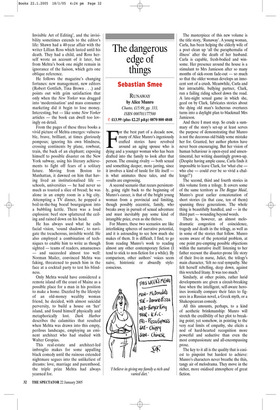The dangerous edge of things
Sebastian Smee
RUNAWAY by Alice Munro Chatto, £15.99, pp. 333, ISBN 000701177500 ✆ £13.99 (plus £2.25 p&p) 0870 800 4848 For the best part of a decade now, many of Alice Munro’s ingeniously crafted stories have revolved around an aging spouse who is dying and a younger woman who has been drafted into the family to look after that person. The ensuing rivalry — both sexual and something deeper, more jarring, since it involves a kind of tussle for life itself is what animates these tales, and the results are engrossing.
A second scenario that recurs persistently, going right back to the beginning of Munro’s career, is that of the bright young woman from a provincial and limiting, though possibly eccentric, family, who breaks away in pursuit of sexual adventure and must inevitably pay some kind of intangible price, even as she thrives.
For Munro, these two scenarios are like interlinking spheres of narrative potential, and it is astounding to see how much she makes of them. It is difficult, I find, to go from reading Munro’s work to reading almost any other contemporary fiction (I tend to stick to non-fiction for a while). By comparison, other authors’ voices seem naive, histrionic or absurdly styleconscious. The masterpiece of this new volume is the title story, ‘Runaway’. A young woman, Carla, has been helping the elderly wife of a poet clean up ‘all the paraphernalia of illness’ after the death of her husband. Carla is capable, fresh-bodied and winsome. Her presence around the house is a stimulant to Mrs Jamieson after so many months of sick-room fade-out — so much so that the older woman develops an innocent sort of a crush. Meanwhile, Carla and her intractable, bullying partner, Clark, run a failing riding school down the road. A late-night sexual game in which she, geed on by Clark, fabricates stories about the dying old man’s lecherous overtures turns into a daylight plan to blackmail Mrs Jamieson.
And there I must stop. So crude a summary of the story’s set-up at least serves the purpose of demonstrating that Munro is not the decorous old biddy some mistake her for. Granted, her author photos have never been encouraging. But her vision of human behaviour is open-eyed and unsentimental, her writing dauntingly grown-up. (Despite having ample cause, Carla finds it impossible to leave Clark, for ‘what else who else — could ever be so vivid a challenge?’) The second, third and fourth stories in this volume form a trilogy. It covers some of the same territory as The Beggar Maid, Munro’s great earlier concatenation of short stories (in that case, ten of them) spanning three generations. The whole thing is beautifully handled, and — in the third part — wounding beyond words.
There is, however, an almost melodramatic congestion of coincidence, tragedy and death in the trilogy, as well as in some of the stories that follow. Munro seems aware of the potential problem, at one point pre-empting possible objections within the narrative itself: listening to her father recount the disaster-prone life story of their live-in nurse, Juliet, the trilogy’s main character, ‘felt no real sympathy. She felt herself rebelling, deep down, against this wretched litany. It was too much.’ Similarly, at other points, rather lurid developments are given a circuit-breaking fuse when the intelligent, self-aware heroines ironically compare their fates to figures in a Russian novel, a Greek myth, or a Shakespearean comedy.
All this amounts, perhaps, to a kind of aesthetic brinkmanship: Munro will stretch the credibility of her plot to breaking point; yet somehow, in pointing to the very real limits of empathy, she elicits a nod of hard-hearted recognition more powerful and seductive than even the most compassionate and all-encompassing prose.
The key to it all is the quality that is easiest to pinpoint but hardest to achieve: Munro’s characters never breathe the thin, tangy air of melodrama. They move in the richer, more oxidised atmosphere of great fiction.













































 Previous page
Previous page